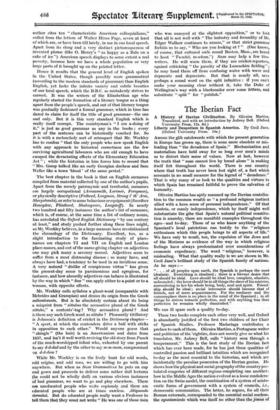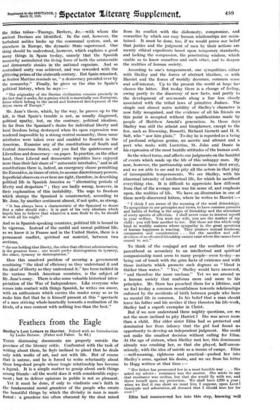The Iberian Fact
Liberty and Despotism in Spanish America. By Cecil Jane. (Oxford University Press. 10a.) AMONG the glib catchwords with which the present generation in Europe has grown up, there is none more obsolete or mis- leading than " the decadence of Spain." Mechanization and materialism have held sway for so long over men's -minds as to distort their sense of values. Now at last, however the truth that " man cannot live by bread alone " is making itself felt throughout the world. There is one country where that truth has never been lost sight of, a fact which accounts in no small measure for the legend of " decadence." That is why many of us look to the qualities and virtues to which Spain has remained faithful to prove the salvation of humanity.
Oliveira Martins has aptly summed up the Iberian contribu- tion to the common wealth as " a profound religious instinct allied with a keen sense of personal independence." Of that homblia, or manly independence, which by itself might well substantiate the gibe that Spain's natural political constitu-. tion is anarchy, there are manifold examples throughout the ages—and to-day. Those of us who know anything of the Spaniard's local patriotism can testify to the "religious. enthusiasm which this people brings to all aspects of life.". We have only to recall, too, the expulsion of the Jews and of the Moriscos as evidence of the way- in which religious feelings have always predominated over considerations of economic expediency. The word " religious," however, is misleading. What that quality really is we are shown in Mr. Cecil Jane's brilliant study of the Spanish family of nations.
As he says: .
it . of all peoples upon earth, the Spanish is perhaps the most idealistic. Everything is idealized ; there ma fervent desire that all should be ideal. Love should be ideal love, complete absolute, unbounded ; the lover should be in all things the slave of his mistress, surrendering to her-his whole being, body, soul and spirit. Friend-' ship should be ideal ; social intecourse should become that of friends, not of mere acquaintances. For the mediocre and the. commonplace there is no place in the mind of the Spaniard ; in all things' he strives towards perfection, and with anything less than perfection he remains wholly dissatisfied."
We can ill spare such a quality to-day.
These two books complete each other very well, and Oxford is abundantly justified of the first two children of her Chair of Spanish Studies. Professor Madariaga contributes. a preface to each of them. Oliveira Martins, a Portuguese writer and politician of the 'eighties, does not merely give us what his translator, Mr. Aubrey Bell, calls " history seen through a temperament." This is the best study of the Iberian fact which has ever been made, for he has just those qualities of controlled passion and brilliant intuition which are recognized to-day as the most essential to the historian, and which are incidentally the peculiar possession of the Iberian genius. Ile shows how the physical and social geography of the country pos- tulated congeries of different regions completing one another; how in the Middle Ages the nation evolved as a loose confedera- tion on the Swiss model, the ccimbination of a system of aristo- cratic forms of government with a system of councils, i.e., democratic communities. The latter, he argues, for all their Roman externals, corresponded to the essential social nucleus, the ayuntamiento which was itself no other than the jimaa of
the Atlas tribes—Tuaregs, Berbers, &c.—with whom the ancient Iberians are identified. In the end, however, the turbulent nobles broke up the communal system, and, as elsewhere in Europe, the dynastic State supervened. One thing should be understood, however, which explains a good many things in. Spain to-day, namely that the Spanish monarchy assimilated the living force of both the aristocratic
and democratic strains in the national organism. And so centralized, unity was achieved, and was rewarded with the
glittering prizes of.the sixteenth century. But Spain remained, as Senhor Martins reminds us, " a democracy presided over by the monarchy." Finally, he gives us the clue to Spain's political history, when he says :- " The originality of the Iberian civilization consists precisely in the fact that it seeks, for a genius WhiCh is essentially non-European, forms which belong to the social and historical development of the Aryan races of Europe."
Mr. Jane's thesis, which, by the way, he proves up to the hilt, is that Spain's trouble is not, as usually diagnosed, political apathy, but, on the contrary, political idealism. So far from the Spaniard's desire for individual liberty and local freedom being destroyed when its open expression was rendered impossible by a strong central monarchy, those same
attributes were taken over and enabled to flourish in the Americas... Examine any of the constitutions of South and Central American States, and you find the quintessence of
Liberalism and democracy—on paper. In practice, on the other hand,, these Liberal and democratic republics have enjoyed more than their fair share of " autocratic interludes," and in all constitutions there is, indeed, an emergency clause permitting the Eiecutive, in times of crisis, to assume discretionary powers. Syperficial observers over here are right, therefore, in describing political life in Spanish America as " alternating periods of liberty and despotism " ; they are badly wrong, however, in their explanation of this instability. The urge to freedom whieii •staitips the Spaniard is counteracted, according to Mr. Jane, by another sentiment almost, if not quite, as strong.
" It has always been a characteristic of the Spaniard to desire that a ruler should rule ; it is part of his very idealism whiCh impels him to believe that whatever a man finds to do, he should do with all his might."
And so in Spanish-speaking countriei, political life is bound to be vigorous. Instead of the sordid and Unreal political life, as we know it in France and in the United States, there is is permanent conflict, spiritual not material, between two sections, " the one holding that liberty, the other that efficient administration, is the greatest boon ; one would prefer disintegration to tyranny, the-other, -tyranny to disintegration?'
How this unsolved problem of securing a government combining " the ideal of efficiency as they understand it and the ideal of liberty as they understand it," has been' tackled in the various South American countries, is the subject of • Mr. Jane's essay. There is also some valuable historical inter- pretation of the War of Independence. Like everyone who comes into -contact with things Spanish, he writes con amore, With an enthusiasm which carries the reader away so as to make him feel that he is himself present at this " spectacle of a race striving whole-heartedly towards a realization of its ideals, of a race content with nothing less than the best." •



















































 Previous page
Previous page